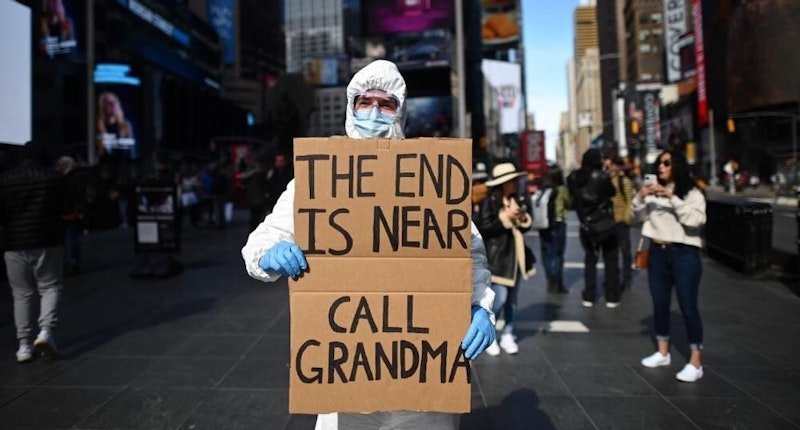If we place the mainstream media to the side with its ready-made, propped-up heroes and James Bond-like villains, its adjuncts of magazine covers, late-night television shows, paid-for experts and heroic Sean Penn Academy Award Ceremony pronouncements, what do we have? Philosopher Alan Watts said that according to Hinduism, “No matter how bad things are, they can always get worse.”
If you’re looking for a more detailed description, the Apocalypse of St. John is one place to start, if only because of its longevity. It describes the events surrounding the Second Coming of Christ, the Last Judgment and the end of the world. As an overall perspective I think it does a great job; perhaps its only flaw is that it doesn’t give exact dates. The long and short of its content is simple: the world’s run by dark forces and is going to hell and our only salvation is in Jesus Christ, so, regardless of the torments inflicted upon us, we must stay faithful to the end.
Another perspective on world events was given by the German historian Oswald Spengler around 1920. Though currently unfashionable, his book The Decline of The West, presents a global interpretation on human affairs. His post-Hegelian thesis in a very small nutshell: civilizations have a period of growth, a period of self-realization and then a period of decline. He says our greatest days are behind us and the best we can do, our most noble course of action, is to accept it and then slip into eternity. Unlike the Apocalypse, Spengler doesn’t offer any salvation, just a gradual fading away into nothing. Perhaps the only optimistic element is that humanity will march on, in ever-changing forms.
More contemporary perspectives include Zbigniew Brzezinski’s outline in his book The Grand Chessboard. His theory and game plan is that for America to maintain its hegemony in the world it needs to keep the rest of world at each other’s throats, broken up and fighting among themselves. I heard a presentation by one of the more intelligent French politicians, Francois Asselineau, in which he discussed this strategy, saying it was the one used by Louis 14th during France’s Golden Age, summed up easily by the formula “divide and conquer.” It involves breaking up Russia and China into small states and turning Europe into a vassal state.
Another perspective worth considering is that of Giorgio Agamben, the Italian philosopher. At one time he was the gold standard of modern philosophical thought, a universal reference. He then committed the great modern sin: at the very beginning of the Covid pandemic (or plandemic as I and some others prefer to call it) didn’t toe the party line. He criticized the lockdowns in Italy, the use of masks, vaccines and emergency measures. He was called senile, out of touch, a danger to the public good and irresponsible. His perspective on current events is that we’re seeing the implementation of what he calls “The State of Exception.” I’ll sum this up as the indefinite maintenance of the suspension of normal democratic law. This refers to the non-democratic binding measures which are put in place during an emergency situation. This leads to tyranny, fascism or worse, and an inhuman world.
Along with Agamben, my favorite perspective on what’s happening today is from the French Marxist Philosopher Francis Cousin. It bears a strong resemblance to all the others, dealing with the end of the world we’re accustomed to, and providing an image of the external processes under which we exist. The central point in his thought is the Marxist idea of the Profit Rate. He demonstrates that all the political decisions and every social movement that affect us, such as the Climate movement, immigration, the LGBTQ+ phenomenon, crime rates, the decline in education standards, the Woke philosophy, the war in Ukraine, Covid, Black Lives Matter—take your pick—everything which plays upon our lives is a necessary consequence of need for the Profit Rate to maintain itself. He shows in an Apocalyptic fashion that we’re in the last stage of a long historical process and that the end is rapidly approaching. Further, there’s a happy ending, the abolition of money and the state and the foundation of a truly human society.

